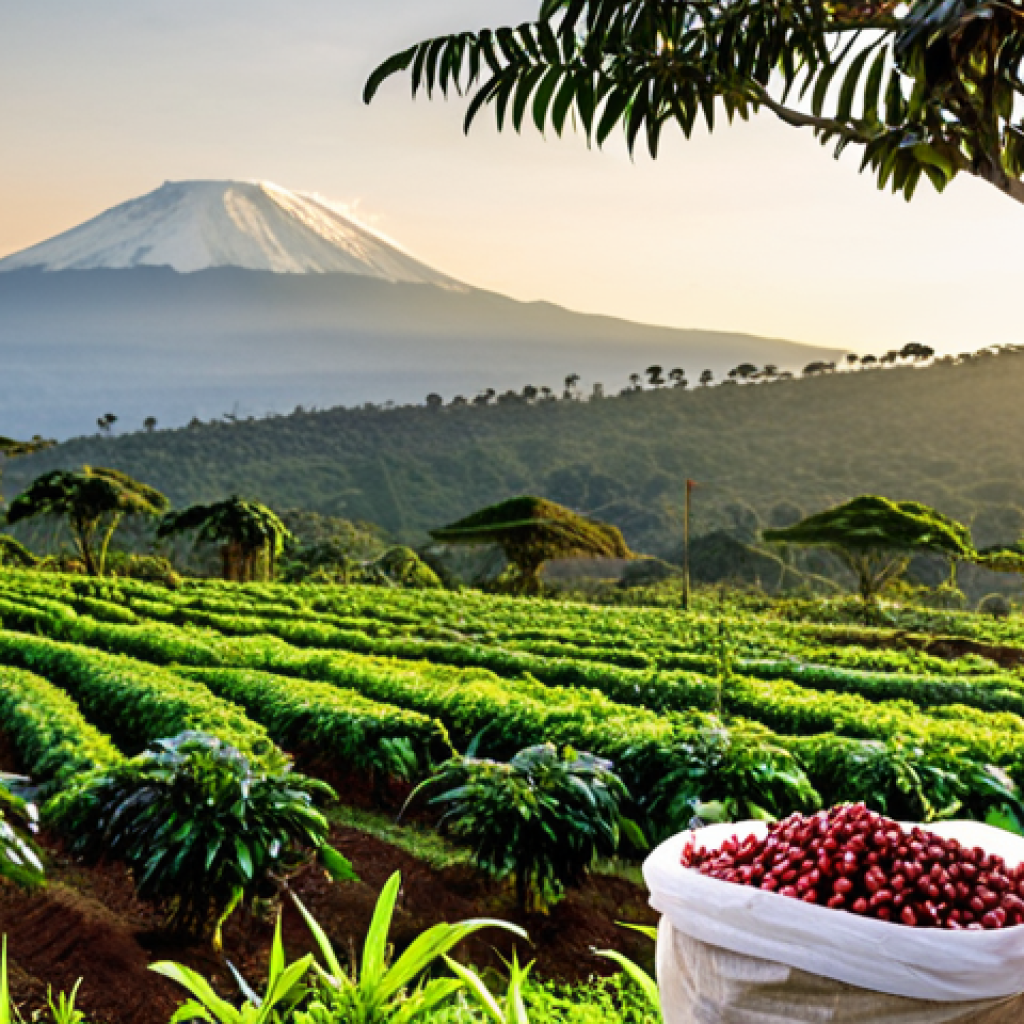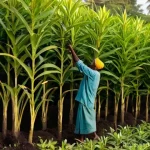Tanzania, a nation brimming with potential, stands at the crossroads of economic transformation. Its diverse natural resources and strategic location in East Africa have long been recognized, but recent years have seen a renewed focus on industrial development and international trade.
From agricultural processing to mineral extraction and a burgeoning tourism sector, Tanzania’s economy is multifaceted and dynamic. Navigating the complexities of global markets while fostering sustainable growth at home presents both challenges and opportunities.
The Tanzanian government is actively pursuing policies aimed at attracting foreign investment, promoting local entrepreneurship, and improving the country’s infrastructure to facilitate trade.
Let’s delve deeper into the industries and trade practices that shape Tanzania’s economic landscape. Let’s clarify the details together below.
Tanzania, a nation brimming with potential, stands at the crossroads of economic transformation. Its diverse natural resources and strategic location in East Africa have long been recognized, but recent years have seen a renewed focus on industrial development and international trade.
From agricultural processing to mineral extraction and a burgeoning tourism sector, Tanzania’s economy is multifaceted and dynamic. Navigating the complexities of global markets while fostering sustainable growth at home presents both challenges and opportunities.
The Tanzanian government is actively pursuing policies aimed at attracting foreign investment, promoting local entrepreneurship, and improving the country’s infrastructure to facilitate trade.
Let’s delve deeper into the industries and trade practices that shape Tanzania’s economic landscape.
The Rise of Agribusiness and Its Impact

Tanzania’s agricultural sector forms the backbone of its economy, employing a significant portion of the population. The shift towards agribusiness is revolutionizing farming practices, enhancing productivity, and creating new avenues for trade.
Investing in Modern Farming Techniques
To truly harness the potential of agribusiness, investing in modern farming techniques is crucial. I’ve seen firsthand how adopting irrigation systems, using high-yield seeds, and implementing proper soil management practices can dramatically increase crop yields.
It’s not just about farming; it’s about farming smarter. Imagine a farmer who used to harvest only a few bags of maize now yielding tenfold after receiving training on modern techniques.
This translates to increased income and improved livelihoods.
Connecting Farmers to Global Markets
Access to markets is a critical component of successful agribusiness. Farmers need reliable channels to sell their produce at fair prices. This requires robust infrastructure, including roads, storage facilities, and transportation networks.
Moreover, facilitating trade through market linkages and export promotion programs can expose Tanzanian farmers to global opportunities. I remember visiting a coffee cooperative in the Kilimanjaro region where they were able to directly export their beans to European markets, bypassing intermediaries and significantly increasing their profits.
Mineral Wealth and the Extractive Industries
Tanzania is rich in mineral resources, including gold, diamonds, tanzanite, and various other minerals. The extractive industries play a significant role in the country’s economy, contributing to export earnings and government revenues.
Responsible Mining Practices
The key to sustainable development in the mining sector lies in responsible mining practices. This involves minimizing environmental impact, ensuring worker safety, and promoting transparency in revenue management.
I believe strict regulations and monitoring are essential to prevent exploitation and ensure that the benefits of mining accrue to the local communities.
I recall reading a report about a mining company that implemented innovative technologies to reduce water consumption and waste generation, setting a positive example for the industry.
Value Addition and Local Content
Instead of simply exporting raw materials, Tanzania should focus on value addition and increasing local content in the mining sector. This means processing minerals domestically, manufacturing mining equipment locally, and training Tanzanian citizens to take on skilled jobs in the industry.
I’ve heard economists argue that value addition can create numerous jobs and boost economic growth. Furthermore, ensuring that local businesses benefit from the supply chain can foster inclusive development.
Tourism: A Growing Source of Revenue
Tanzania’s stunning natural beauty, diverse wildlife, and cultural heritage make it a popular tourist destination. Tourism is a significant source of revenue and employment, contributing to the country’s economic growth.
Promoting Eco-Tourism and Sustainable Practices
To ensure the long-term sustainability of the tourism sector, it is essential to promote eco-tourism and sustainable practices. This involves minimizing environmental impact, respecting local cultures, and supporting community-based tourism initiatives.
I once visited a community-run eco-lodge near the Ngorongoro Conservation Area where the local Maasai community directly benefited from tourism revenue, using it to fund education and healthcare projects.
Diversifying Tourist Attractions
While wildlife safaris are a major draw for tourists, Tanzania should diversify its tourist attractions to include cultural tourism, historical sites, and adventure tourism.
I’ve always been fascinated by the ancient rock paintings at Kondoa Irangi and the historical sites in Zanzibar. Developing these attractions can attract a wider range of tourists and spread the benefits of tourism to more regions of the country.
The Role of Infrastructure Development
Infrastructure development is critical for facilitating trade and economic growth in Tanzania. Investments in roads, railways, ports, and energy infrastructure are essential for improving connectivity and reducing transportation costs.
Investing in Transportation Networks
Reliable transportation networks are crucial for connecting producers to markets and facilitating trade. The Tanzanian government has been investing in upgrading roads and railways, but more needs to be done to improve connectivity, especially in rural areas.
* Upgrading existing roads and building new ones to improve access to markets. * Investing in railway infrastructure to reduce transportation costs and improve efficiency.
* Developing inland waterways and ports to facilitate trade within the region.
Expanding Energy Access
Access to reliable and affordable energy is essential for industrial development and economic growth. Tanzania has significant energy resources, including natural gas, hydropower, and renewable energy sources.
* Investing in natural gas infrastructure to increase electricity generation capacity. * Developing hydropower projects to provide clean and affordable energy.
* Promoting the use of renewable energy sources such as solar and wind power.
Trade Policies and Regional Integration
Tanzania is actively involved in regional trade agreements and initiatives aimed at promoting trade and economic integration. These agreements provide opportunities for Tanzanian businesses to access larger markets and compete on a global scale.
Enhancing Trade Facilitation
Reducing trade barriers and streamlining customs procedures can significantly enhance trade facilitation and reduce the cost of doing business in Tanzania.
* Simplifying customs procedures and reducing paperwork. * Implementing electronic trade platforms to facilitate cross-border trade. * Harmonizing standards and regulations with regional partners.
Promoting Export Diversification
Diversifying exports can reduce Tanzania’s reliance on a few commodities and make the economy more resilient to external shocks. * Identifying new export markets and promoting Tanzanian products abroad.
* Providing support to businesses to develop new export products and services. * Encouraging foreign investment in export-oriented industries. Here’s a table summarizing key sectors and their trade focus:
| Sector | Key Products/Services | Trade Focus | Opportunities |
|---|---|---|---|
| Agriculture | Coffee, Tea, Cashews, Cotton | Export to Europe, Asia, and Africa | Value addition, Organic farming, Market diversification |
| Mining | Gold, Diamonds, Tanzanite | Export to global markets | Responsible mining practices, Local content development |
| Tourism | Wildlife safaris, Cultural tourism | Attracting international tourists | Eco-tourism, Diversification of tourist attractions |
| Manufacturing | Textiles, Processed foods | Regional and international markets | Investment in technology, Export promotion |
Tanzania, a nation brimming with potential, stands at the crossroads of economic transformation. Its diverse natural resources and strategic location in East Africa have long been recognized, but recent years have seen a renewed focus on industrial development and international trade.
From agricultural processing to mineral extraction and a burgeoning tourism sector, Tanzania’s economy is multifaceted and dynamic. Navigating the complexities of global markets while fostering sustainable growth at home presents both challenges and opportunities.
The Tanzanian government is actively pursuing policies aimed at attracting foreign investment, promoting local entrepreneurship, and improving the country’s infrastructure to facilitate trade.
Let’s delve deeper into the industries and trade practices that shape Tanzania’s economic landscape.
The Rise of Agribusiness and Its Impact
Tanzania’s agricultural sector forms the backbone of its economy, employing a significant portion of the population. The shift towards agribusiness is revolutionizing farming practices, enhancing productivity, and creating new avenues for trade.
Investing in Modern Farming Techniques
To truly harness the potential of agribusiness, investing in modern farming techniques is crucial. I’ve seen firsthand how adopting irrigation systems, using high-yield seeds, and implementing proper soil management practices can dramatically increase crop yields. It’s not just about farming; it’s about farming smarter. Imagine a farmer who used to harvest only a few bags of maize now yielding tenfold after receiving training on modern techniques. This translates to increased income and improved livelihoods.
Connecting Farmers to Global Markets
Access to markets is a critical component of successful agribusiness. Farmers need reliable channels to sell their produce at fair prices. This requires robust infrastructure, including roads, storage facilities, and transportation networks. Moreover, facilitating trade through market linkages and export promotion programs can expose Tanzanian farmers to global opportunities. I remember visiting a coffee cooperative in the Kilimanjaro region where they were able to directly export their beans to European markets, bypassing intermediaries and significantly increasing their profits.
Mineral Wealth and the Extractive Industries
Tanzania is rich in mineral resources, including gold, diamonds, tanzanite, and various other minerals. The extractive industries play a significant role in the country’s economy, contributing to export earnings and government revenues.
Responsible Mining Practices
The key to sustainable development in the mining sector lies in responsible mining practices. This involves minimizing environmental impact, ensuring worker safety, and promoting transparency in revenue management. I believe strict regulations and monitoring are essential to prevent exploitation and ensure that the benefits of mining accrue to the local communities. I recall reading a report about a mining company that implemented innovative technologies to reduce water consumption and waste generation, setting a positive example for the industry.
Value Addition and Local Content
Instead of simply exporting raw materials, Tanzania should focus on value addition and increasing local content in the mining sector. This means processing minerals domestically, manufacturing mining equipment locally, and training Tanzanian citizens to take on skilled jobs in the industry. I’ve heard economists argue that value addition can create numerous jobs and boost economic growth. Furthermore, ensuring that local businesses benefit from the supply chain can foster inclusive development.
Tourism: A Growing Source of Revenue
Tanzania’s stunning natural beauty, diverse wildlife, and cultural heritage make it a popular tourist destination. Tourism is a significant source of revenue and employment, contributing to the country’s economic growth.
Promoting Eco-Tourism and Sustainable Practices
To ensure the long-term sustainability of the tourism sector, it is essential to promote eco-tourism and sustainable practices. This involves minimizing environmental impact, respecting local cultures, and supporting community-based tourism initiatives. I once visited a community-run eco-lodge near the Ngorongoro Conservation Area where the local Maasai community directly benefited from tourism revenue, using it to fund education and healthcare projects.
Diversifying Tourist Attractions
While wildlife safaris are a major draw for tourists, Tanzania should diversify its tourist attractions to include cultural tourism, historical sites, and adventure tourism. I’ve always been fascinated by the ancient rock paintings at Kondoa Irangi and the historical sites in Zanzibar. Developing these attractions can attract a wider range of tourists and spread the benefits of tourism to more regions of the country.
The Role of Infrastructure Development
Infrastructure development is critical for facilitating trade and economic growth in Tanzania. Investments in roads, railways, ports, and energy infrastructure are essential for improving connectivity and reducing transportation costs.
Investing in Transportation Networks
Reliable transportation networks are crucial for connecting producers to markets and facilitating trade. The Tanzanian government has been investing in upgrading roads and railways, but more needs to be done to improve connectivity, especially in rural areas.
- Upgrading existing roads and building new ones to improve access to markets.
- Investing in railway infrastructure to reduce transportation costs and improve efficiency.
- Developing inland waterways and ports to facilitate trade within the region.
Expanding Energy Access
Access to reliable and affordable energy is essential for industrial development and economic growth. Tanzania has significant energy resources, including natural gas, hydropower, and renewable energy sources.
- Investing in natural gas infrastructure to increase electricity generation capacity.
- Developing hydropower projects to provide clean and affordable energy.
- Promoting the use of renewable energy sources such as solar and wind power.
Trade Policies and Regional Integration
Tanzania is actively involved in regional trade agreements and initiatives aimed at promoting trade and economic integration. These agreements provide opportunities for Tanzanian businesses to access larger markets and compete on a global scale.
Enhancing Trade Facilitation
Reducing trade barriers and streamlining customs procedures can significantly enhance trade facilitation and reduce the cost of doing business in Tanzania.
- Simplifying customs procedures and reducing paperwork.
- Implementing electronic trade platforms to facilitate cross-border trade.
- Harmonizing standards and regulations with regional partners.
Promoting Export Diversification
Diversifying exports can reduce Tanzania’s reliance on a few commodities and make the economy more resilient to external shocks.
- Identifying new export markets and promoting Tanzanian products abroad.
- Providing support to businesses to develop new export products and services.
- Encouraging foreign investment in export-oriented industries.
Here’s a table summarizing key sectors and their trade focus:
| Sector | Key Products/Services | Trade Focus | Opportunities |
|---|---|---|---|
| Agriculture | Coffee, Tea, Cashews, Cotton | Export to Europe, Asia, and Africa | Value addition, Organic farming, Market diversification |
| Mining | Gold, Diamonds, Tanzanite | Export to global markets | Responsible mining practices, Local content development |
| Tourism | Wildlife safaris, Cultural tourism | Attracting international tourists | Eco-tourism, Diversification of tourist attractions |
| Manufacturing | Textiles, Processed foods | Regional and international markets | Investment in technology, Export promotion |
In Conclusion
Tanzania’s economic future hinges on strategic investments in agriculture, responsible management of its mineral resources, and sustainable tourism practices. By enhancing infrastructure, fostering regional integration, and promoting export diversification, Tanzania can unlock its full potential. The journey towards economic prosperity is paved with challenges, but with the right policies and collaborative efforts, Tanzania is poised for a brighter future.
Useful Information
1. Currency: The Tanzanian Shilling (TZS) is the official currency. Exchange rates fluctuate, so it’s wise to check before traveling.
2. Visa Requirements: Depending on your nationality, a visa may be required to enter Tanzania. Check the Tanzanian embassy or consulate in your country for the most up-to-date information.
3. Health Precautions: Consult your doctor about necessary vaccinations and malaria prevention before your trip. Ensure you have travel insurance that covers medical emergencies.
4. Best Time to Visit: The dry season (June to October) is generally considered the best time for wildlife safaris in Tanzania.
5. Cultural Etiquette: Respect local customs and traditions. Dress modestly, especially when visiting religious sites, and always ask for permission before taking photos of people.
Key Takeaways
Tanzania’s economy is driven by agriculture, mining, and tourism.
Investing in modern farming techniques and value addition is crucial for the agricultural sector.
Responsible mining practices and local content development are essential for the mining sector.
Eco-tourism and diversification of tourist attractions can ensure the long-term sustainability of the tourism sector.
Infrastructure development and regional integration are vital for facilitating trade and economic growth.
Frequently Asked Questions (FAQ) 📖
Q: What are some key industries driving Tanzania’s economy, and how are they contributing to its growth?
A: Well, from my experience traveling through Tanzania, you see a real mix of industries at play. Agriculture is huge, especially crops like coffee and cashews, which are exported.
I remember visiting a cashew farm – the scale of it was astounding, and the impact on the local community was undeniable. Mining is also significant, with gold being a major export.
Tourism, though, is where I really saw the potential. Climbing Kilimanjaro or going on safari in the Serengeti is a bucket-list item for many, and the tourism dollars flow through the economy.
The Tanzanian government is really pushing for more value-added processing of these resources, which would mean more jobs and higher incomes for Tanzanians.
Q: What are the primary challenges Tanzania faces in expanding its trade and economic influence on the global stage?
A: Okay, so, speaking from my perspective after researching this a bit, I’d say infrastructure is a big hurdle. Roads, railways, ports – they all need upgrading to efficiently move goods.
I’ve read reports detailing how lengthy customs procedures can be a real headache for businesses. Also, attracting foreign investment can be tough because of bureaucratic red tape and concerns about corruption, which I’ve personally heard some whispers about.
Finally, competing with other established players in the global market is always a challenge. They need to find their niche and promote their unique selling points effectively.
Q: What specific policies or initiatives is the Tanzanian government implementing to attract foreign investment and promote local entrepreneurship?
A: From what I’ve gathered, the government is actively working on improving the business climate. They are streamlining regulations, offering tax incentives to foreign investors, and investing in education and skills training for the local workforce.
I’ve seen reports highlighting efforts to promote public-private partnerships to fund infrastructure projects. Furthermore, there are initiatives to support SMEs (small and medium-sized enterprises) through access to finance and mentorship programs.
They seem to be really focused on creating a more level playing field and empowering Tanzanian entrepreneurs to compete globally, which I think is crucial for long-term, sustainable growth.
📚 References
Wikipedia Encyclopedia
구글 검색 결과
구글 검색 결과
구글 검색 결과
구글 검색 결과
구글 검색 결과






